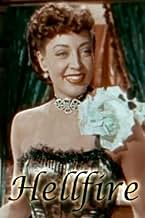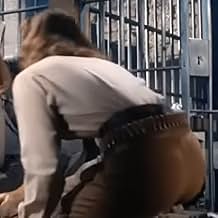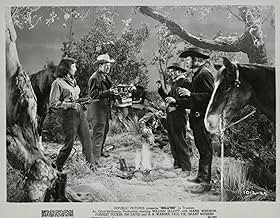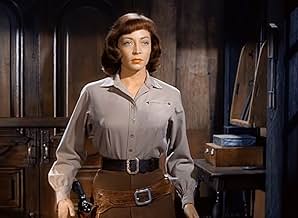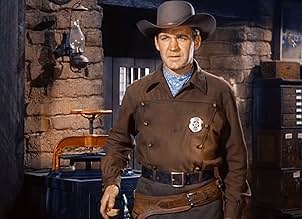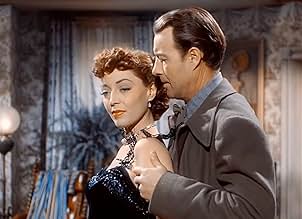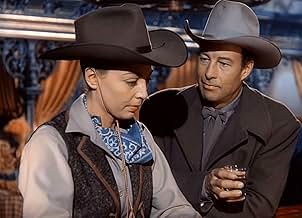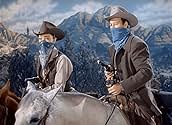IMDb-BEWERTUNG
6,6/10
450
IHRE BEWERTUNG
Füge eine Handlung in deiner Sprache hinzuA reformed gambler turned preacher partnered with a pretty female fugitive outlaw runs into an old pal who's also a marshal, and they both fall for the same bad gal.A reformed gambler turned preacher partnered with a pretty female fugitive outlaw runs into an old pal who's also a marshal, and they both fall for the same bad gal.A reformed gambler turned preacher partnered with a pretty female fugitive outlaw runs into an old pal who's also a marshal, and they both fall for the same bad gal.
- Regie
- Drehbuch
- Hauptbesetzung
Bill Elliott
- Zeb Smith
- (as William Elliott)
Louis Faust
- Red Stoner
- (as Louis R. Faust)
Richard Alexander
- Blacksmith
- (Nicht genannt)
Fred Carson
- Cantina Barfly
- (Nicht genannt)
Empfohlene Bewertungen
This is one of the best "B" westerns ever made. It stars the queen of the "B"s herself -- Marie Windsor, along with those two other great "B" stars, "Wild Bill" Elliott and Forrest Tucker.
It has an unusual twist which sets it apart from other westerns; Bill Elliot plays a card sharp and all-around bad dude whose life is saved by a preacher who takes a bullet meant for Wild Bill (all this takes place in the first five minutes of the movie so the plot is not ruined for you).
Bill promises the dying preacher that he will complete the preacher's mission and collect the money needed to build a church. He also promised to "follow the rules" i.e., raise the money without resorting to crime.
Bill Elliott's efforts to change his ways and avoid temptation make for a great movie.
It has an unusual twist which sets it apart from other westerns; Bill Elliot plays a card sharp and all-around bad dude whose life is saved by a preacher who takes a bullet meant for Wild Bill (all this takes place in the first five minutes of the movie so the plot is not ruined for you).
Bill promises the dying preacher that he will complete the preacher's mission and collect the money needed to build a church. He also promised to "follow the rules" i.e., raise the money without resorting to crime.
Bill Elliott's efforts to change his ways and avoid temptation make for a great movie.
I have heard of Marie Windsor, but never saw her in a film prior to this. Because she toiled at poverty-row studios I guess I had a prejudice against her without ever having seen her, but boy! She was terrific. Her character as Doll in this western with a religious twist was strongly written and strongly played. William Elliot seemed just right in his role as a bad boy trying to walk the straight-and-narrow. This really is a unique film in the history of westerns and the Trucolor makes this a time capsule of poverty-row color technology. Essentially a two-color process, it shows up in red-orange and green, although the skies appear as blue. The print streamed on Netflix was in excellent shape, with no excessive lines or dirt present, and the overall experience was one of gratitude that they have managed to save so many of these low-budget studio films. To the casual viewer who thinks only the majors could achieve quality, the modern-day viewing of some of these B films proves that they too could achieve quality if not consistently then at least occasionally.
You can't ask for more in a western than Wild Bill Elliott and Marie Windsor. Elliott was one of the manliest and most genuine western stars of the '40's, and no woman had more strong charactered parts in B westerns and film noirs than Marie Windsor.
This is a rousing movie about redemption and the hard road to reach it. Things don't come easy for the two stars, but they both just keep on a pluggin' away in true western style. What makes this movie more than just another formulaic oater is the fact that Doll Brown (Marie) is not your average swooning damsel in distress. One gets the feeling that the two stars had genuine affection for each other (notice that I said affection, not lust) and this shows through in the film.
Changes in the characters that take place during Hellfire seem like changes that would really happen if two people liked each other- it is not the usual surrender of one star (almost always the female lead) to the strength of the dominant one (almost always the male lead).
If you like Westerns (and here I mean not just Howard Hawkes or John Ford films and not just any weak programmer destined for a Saturday matinée second feature), you should enjoy this one.
This is a rousing movie about redemption and the hard road to reach it. Things don't come easy for the two stars, but they both just keep on a pluggin' away in true western style. What makes this movie more than just another formulaic oater is the fact that Doll Brown (Marie) is not your average swooning damsel in distress. One gets the feeling that the two stars had genuine affection for each other (notice that I said affection, not lust) and this shows through in the film.
Changes in the characters that take place during Hellfire seem like changes that would really happen if two people liked each other- it is not the usual surrender of one star (almost always the female lead) to the strength of the dominant one (almost always the male lead).
If you like Westerns (and here I mean not just Howard Hawkes or John Ford films and not just any weak programmer destined for a Saturday matinée second feature), you should enjoy this one.
Billy Graham proudly declared 'Mr.Texas' (1951), the maiden production of his company World Wide Films, "the first Christian Western". He probably didn't go to the movies much, otherwise he might have known about John Ford's '3 Godfathers' and 'WagonMaster', sandwiched between which came this rollicking candidate for cult status alongside 'Johnny Guitar'; although it's unlikely that the Reverend Graham would have approved of it bearing a title suggesting damnation rather than salvation.
Immaculately directed by R.G.Springsteen and atmospherically photographed by Jack Marta in Trucolor (like 'Johnny Guitar'), Dorrell & Stuart McGowan's tremendous script bears a passing resemblance to both 'Destry Rides Again' and to Ralph Nelson's 'Lilies of the Field' (1963), in which Sydney Poitier helped build a chapel for a group of nuns. Here the wonderfully laconic Wild Bill Elliott (billed as 'William') as former gambler Zeb Smith dedicates himself to honouring the dying wish of preacher H.B.Warner (who over twenty years earlier had played The Messiah himself in DeMille's 'The King of Kings') by raising the money to build a church in his memory.
Although from now on never without his Bible (which he calls 'The Rule Book'), unlike Destry Smith still relies upon his fists and his six-shooter to resolve tricky situations, on the grounds that it "Seems to be the only kind of sermon I can make folks listen to". The fun really starts with the entrance of the always awesome Marie Windsor as sloe-eyed female outlaw Doll Brown - "Fast on the draw and fast on the jaw" - who recoils from Smith's Bible like a vampire from a crucifix.
Without the film's religious content it's interesting to speculate on how some of the film's heady brew of sex and violence would otherwise have fared with the Breen Office - there's a torture sequence when Smith is strung up like Christ and a lit lamp held against his bared back; and it has a fascinatingly ambiguous ending probably dictated by just how far a criminal past was then permitted to go unpunished.
Immaculately directed by R.G.Springsteen and atmospherically photographed by Jack Marta in Trucolor (like 'Johnny Guitar'), Dorrell & Stuart McGowan's tremendous script bears a passing resemblance to both 'Destry Rides Again' and to Ralph Nelson's 'Lilies of the Field' (1963), in which Sydney Poitier helped build a chapel for a group of nuns. Here the wonderfully laconic Wild Bill Elliott (billed as 'William') as former gambler Zeb Smith dedicates himself to honouring the dying wish of preacher H.B.Warner (who over twenty years earlier had played The Messiah himself in DeMille's 'The King of Kings') by raising the money to build a church in his memory.
Although from now on never without his Bible (which he calls 'The Rule Book'), unlike Destry Smith still relies upon his fists and his six-shooter to resolve tricky situations, on the grounds that it "Seems to be the only kind of sermon I can make folks listen to". The fun really starts with the entrance of the always awesome Marie Windsor as sloe-eyed female outlaw Doll Brown - "Fast on the draw and fast on the jaw" - who recoils from Smith's Bible like a vampire from a crucifix.
Without the film's religious content it's interesting to speculate on how some of the film's heady brew of sex and violence would otherwise have fared with the Breen Office - there's a torture sequence when Smith is strung up like Christ and a lit lamp held against his bared back; and it has a fascinatingly ambiguous ending probably dictated by just how far a criminal past was then permitted to go unpunished.
Real western addicts acknowledge that Republic Studios, despite their cost-cutting measures, turned out the absolute best horse operas in history. This fine and little known movie is exceptional even by Republic standards. No subtle stuff here....just an unusually tight and suspenseful script, committed performances from seasoned western stars and, of course, plenty of the usual gunfight action.
Wusstest du schon
- Zitate
[first lines]
Narrator: Man, with his misdeeds, kindles his own hellfire!
- VerbindungenReferenced in Skip E. Lowe Looks at Hollywood: Marie Windsor/Cesar Romero (1985)
Top-Auswahl
Melde dich zum Bewerten an und greife auf die Watchlist für personalisierte Empfehlungen zu.
Details
- Laufzeit1 Stunde 30 Minuten
- Seitenverhältnis
- 1.37 : 1
Zu dieser Seite beitragen
Bearbeitung vorschlagen oder fehlenden Inhalt hinzufügen

Oberste Lücke
By what name was Kopfpreis 5000 Dollar (1949) officially released in India in English?
Antwort
